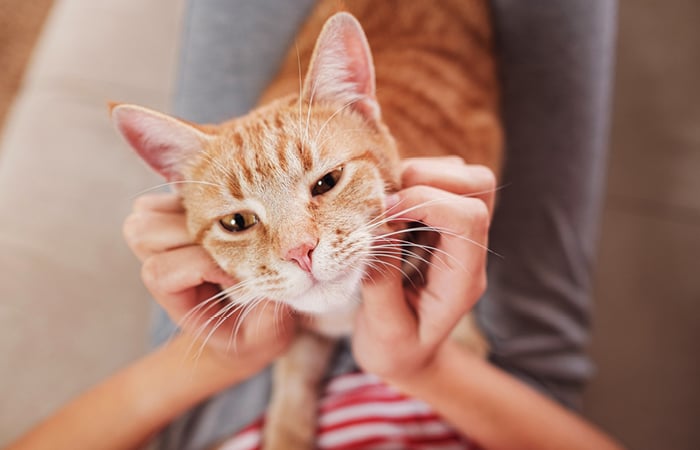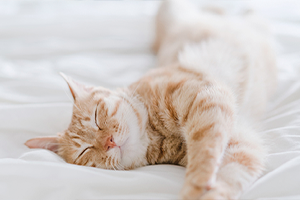Why do cats snore - and is snoring in cats normal?
Quick Links
Why does my cat snore?
Your cat is most likely to snore during the deepest stage of sleep. As their body relaxes completely, the soft tissues around the passageways of the nose and throat relax, too.
Like humans, cats have a loose flap of skin at the back of the nasal passage, which is generally very useful – it lets air pass through when we breathe, but it means water doesn’t go up our nose when we drink. It’s the vibration of this flap when we’re relaxed and asleep that we recognise as snoring. The shape of an animal’s head and face affects the size and position of the flap, which means that some animals are more prone to snoring than others.
Your cat is less likely to snore in REM (rapid-eye movement) sleep, also known as dream sleep. This is when you might notice your sleeping pet twitching, jerking or squeaking as they act out fragments of their feline dreams.
Sometimes a cat purr sounds like snoring. If you’re not sure whether your pet is snoring or purring, listen carefully. A cat’s purr is a fairly constant sound, but a snore changes in time with their breathing and is louder when they exhale.
Is cat snoring normal, and when should I be worried?
Why is my cat snoring all of a sudden?
Sometimes cats snore simply because they’re sleeping in a strange position. You might hear your cat snoring loudly when they’re snoozing with their head upside down or squashed against the edge of their bed, putting pressure on their nasal passages. Once they move and their airways open up, the snoring stops.
Like humans, cats may snore if they have a stuffy nose. The causes are often the same as in humans, too: upper respiratory infections, such as cat flu, or an allergic reaction to pollen, dust or something else in their environment.
Something partially blocking the airways can also be a cause of snoring in cats. This might be a foreign body – perhaps a seed inhaled in the garden – or a growth such as a polyp, dental abscess or tumour. So, if snoring seems to be associated with wider breathing problems, or signs of pain or irritation in your cat, do get them checked out by your vet.
As cats age, their soft palate can become more flaccid, so you may notice an elderly cat snoring more. Meanwhile, weight gain can also make snoring more likely (of which more below).
Can cat snoring be caused by being overweight?
If your pet is overweight – as around half of cats in the UK are – an accumulation of fat in the tissues around the airways means you’re more likely to hear your cat snoring while sleeping.
While the snoring itself is nothing to worry about, overweight cats are more likely to develop joint problems, urinary tract infections and diabetes. If you’re concerned about your cat’s weight, have a chat with your vet about weight-loss strategies.
Why is my cat snoring and sneezing?
Do some cat breeds snore more than others?
Some breeds of cat, such as Persians, are flat-faced, or ‘brachycephalic’ – they have a short muzzle and flattened facial features. This can also result in smaller nostrils, an elongated soft palate or narrower windpipe, which is why a flat-faced cat may be more likely to snore.
If your flat-faced feline also breathes noisily when awake, frequently coughs and gags, or routinely breathes through their mouth, tell your vet about it. Surgery may help correct the problem and get your cat breathing more easily.
Why is my cat snoring while awake?
A cat that makes snoring sounds when awake is almost certainly not snoring. Noisy breathing is usually caused by a narrowing of the airways, perhaps due to inflammation, a collapse of the larynx or trachea, or a growth such as a polyp or tumour.
If you notice a sudden change in your cat’s breathing sounds, it’s always a good idea to take them to the vet. If the noise isn’t constant, take a video to show the vet and keep a diary to see if the noisy breathing follows a pattern – is it worse after exercise or while eating, for example?
What if my cat’s loud snoring is keeping me awake?
Petplan is a trading name of Pet Plan Limited (Registered in England No. 1282939) and Allianz Insurance plc (Registered in England No. 84638), Registered office: 57 Ladymead, Guildford, Surrey GU1 1DB.
Pet Plan Limited is authorised and regulated by the Financial Conduct Authority. Financial Services Register No. 311969. Allianz Insurance plc is authorised by the Prudential Regulation Authority and regulated by the Financial Conduct Authority and the Prudential Regulation Authority. Financial Services Register No. 121849. Pet Plan Limited is a subsidiary of Allianz Insurance plc.















